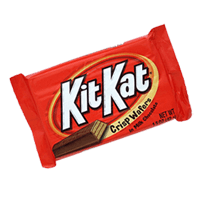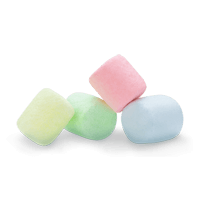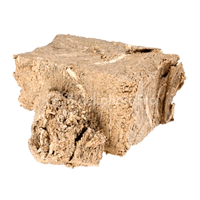Jelly bean nutrition: calories, carbs, GI, protein, fiber, fats
Candies, jellybeans
*all the values are displayed for the amount of 100 grams
Top nutrition facts for Jelly bean
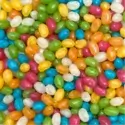
| Calories ⓘ Calories for selected serving | 375 kcal |
|
Glycemic index ⓘ
Source:
Check out our Glycemic index chart page for the full list.
|
80 (high) |
| Glycemic load | 8 (low) |
| Insulin index ⓘ https://academic.oup.com/ajcn/article/66/5/1264/4655967 – 160 | 160 |
| Net Carbs ⓘ Net Carbs = Total Carbohydrates – Fiber – Sugar Alcohols | 93 grams |
| Default serving size ⓘ Serving sizes are mostly taken from FDA's Reference Amounts Customarily Consumed (RACCs) | 10 small (11 grams) |
| Acidity (Based on PRAL) ⓘ PRAL (Potential renal acid load) is calculated using a formula. On the PRAL scale the higher the positive value, the more is the acidifying effect on the body. The lower the negative value, the higher the alkalinity of the food. 0 is neutral. | -0.7 (alkaline) |
Net carbs ⓘHigher in Net carbs content than 100% of foods
Carbs ⓘHigher in Carbs content than 100% of foods
Calories ⓘHigher in Calories content than 81% of foods
Sugar ⓘHigher in Sugar content than 79% of foods
Fiber ⓘHigher in Fiber content than 41% of foods
Jelly bean calories (kcal)
| Calories for different serving sizes of jelly bean | Calories | Weight |
|---|---|---|
| Calories in 100 grams | 375 | |
| Calories in 10 small | 41 | 11 g |
Jelly bean Glycemic index (GI)
Source:
Check out our Glycemic index chart page for the full list.
Jelly bean Glycemic load (GL)
Mineral coverage chart
Mineral chart - relative view
Vitamin coverage chart
Vitamin A:
0µg of 900µg
0%
Vitamin E:
0mg of 15mg
0%
Vitamin D:
0µg of 20µg
0%
Vitamin C:
0mg of 90mg
0%
Vitamin B1:
0.01mg of 1mg
1%
Vitamin B2:
0.03mg of 1mg
2.5%
Vitamin B3:
0.02mg of 16mg
0.15%
Vitamin B5:
0.03mg of 5mg
0.54%
Vitamin B6:
0.01mg of 1mg
0.92%
Folate:
0µg of 400µg
0%
Vitamin B12:
0µg of 2µg
0%
Vitamin K:
0µg of 120µg
0%
Vitamin chart - relative view
Macronutrients chart
Protein:
Daily Value: 0%
0 g of 50 g
0 g (0% of DV )
Fats:
Daily Value: 0%
0.1 g of 65 g
0.1 g (0% of DV )
Carbs:
Daily Value: 31%
93.6 g of 300 g
93.6 g (31% of DV )
Water:
Daily Value: 0%
6.3 g of 2,000 g
6.3 g (0% of DV )
Other:
0.1 g
0.1 g
Fiber content ratio for Jelly bean
Sugar:
70 g
Fiber:
0.2 g
Other:
23 g
All nutrients for Jelly bean per 100g
| Nutrient | Value | DV% | In TOP % of foods | Comparison |
| Vitamin A | 0µg | 0% | 100% | |
| Calories | 375kcal | 19% | 19% |
8 times more than Orange
|
| Protein | 0g | 0% | 100% |
N/A
|
| Fats | 0.05g | 0% | 95% |
666.2 times less than Cheese
|
| Vitamin C | 0mg | 0% | 100% |
N/A
|
| Net carbs | 93g | N/A | 0% |
1.7 times more than Chocolate
|
| Carbs | 94g | 31% | 0% |
3.3 times more than Rice
|
| Cholesterol | 0mg | 0% | 100% |
N/A
|
| Vitamin D | 0µg | 0% | 100% |
N/A
|
| Magnesium | 2mg | 0% | 96% |
70 times less than Almonds
|
| Calcium | 3mg | 0% | 95% |
41.7 times less than Milk
|
| Potassium | 37mg | 1% | 93% |
4 times less than Cucumber
|
| Iron | 0.13mg | 2% | 92% |
20 times less than Beef broiled
|
| Sugar | 70g | N/A | 21% |
7.8 times more than Coca-Cola
|
| Fiber | 0.2g | 1% | 59% |
12 times less than Orange
|
| Copper | 0.03mg | 3% | 90% |
5.1 times less than Shiitake
|
| Zinc | 0.05mg | 0% | 94% |
126.2 times less than Beef broiled
|
| Phosphorus | 4mg | 1% | 96% |
45.5 times less than Chicken meat
|
| Sodium | 50mg | 2% | 72% |
9.8 times less than White bread
|
| Vitamin E | 0mg | 0% | 100% |
N/A
|
| Manganese | 0.04mg | 2% | 70% | |
| Selenium | 1.1µg | 2% | 81% | |
| Vitamin B1 | 0mg | 0% | 95% |
66.5 times less than Pea raw
|
| Vitamin B2 | 0.01mg | 1% | 95% |
11.8 times less than Avocado
|
| Vitamin B3 | 0.01mg | 0% | 96% |
1196.6 times less than Turkey meat
|
| Vitamin B5 | 0.01mg | 0% | 96% |
125.6 times less than Sunflower seeds
|
| Vitamin B6 | 0mg | 0% | 95% |
29.8 times less than Oats
|
| Vitamin B12 | 0µg | 0% | 100% |
N/A
|
| Vitamin K | 0µg | 0% | 100% |
N/A
|
| Folate | 0µg | 0% | 100% |
N/A
|
| Saturated fat | 0g | 0% | 100% |
N/A
|
| Choline | 0mg | 0% | 100% | |
| Monounsaturated fat | 0g | N/A | 100% |
N/A
|
| Polyunsaturated fat | 0g | N/A | 100% |
N/A
|
| Caffeine | 0mg | 0% | 100% | |
| Omega-3 - EPA | 0g | N/A | 100% |
N/A
|
| Omega-3 - DHA | 0g | N/A | 100% |
N/A
|
| Omega-3 - DPA | 0g | N/A | 100% |
N/A
|
Check out similar food or compare with current
NUTRITION FACTS LABEL
Nutrition Facts
___servings per container
Serving Size ______________
Serving Size ______________
Amount Per 100g
Calories 375
% Daily Value*
0.08%
Total Fat
0.05g
0
Saturated Fat 0g
0
Trans Fat
0g
0
Cholesterol 0mg
2.2%
Sodium 50mg
31%
Total Carbohydrate
94g
0.8%
Dietary Fiber
0.2g
Total Sugars 0g
Includes ? g Added Sugars
Protein
0g
Vitamin D
0mcg
0
Calcium
3mg
0.3%
Iron
0.13mg
1.6%
Potassium
37mg
1.1%
*
The % Daily Value (DV) tells you how much a nutrient in a serving of food contributes to a daily diet. 2,000 calories a day is used for general nutrition advice.
Health checks
ⓘ
Dietary cholesterol is not associated with an increased risk of coronary heart disease in healthy individuals. However, dietary cholesterol is common in foods that are high in harmful saturated fats.
Source
Low in Cholesterol
ⓘ
Trans fat consumption increases the risk of cardiovascular disease and mortality by negatively affecting blood lipid levels.
Source
No Trans Fats
ⓘ
Saturated fat intake can raise total cholesterol and LDL (low-density lipoprotein) levels, leading to an increased risk of atherosclerosis. Dietary guidelines recommend limiting saturated fats to under 10% of calories a day.
Source
Low in Saturated Fats
ⓘ
While the consumption of moderate amounts of added sugars is not detrimental to health, an excessive intake can increase the risk of obesity, and therefore, diabetes.
Source
Low in Sugars
Jelly bean nutrition infographic
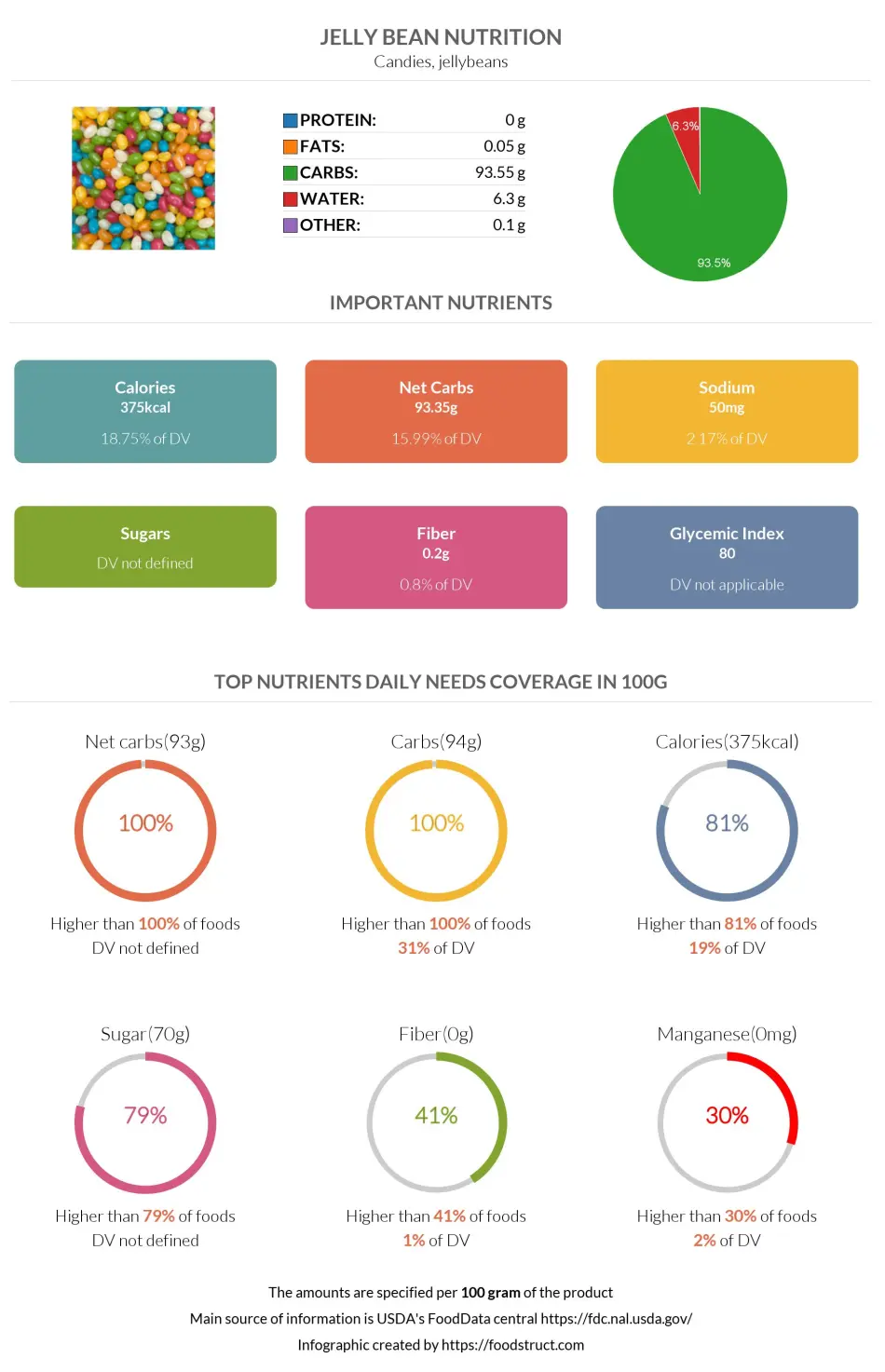
Infographic link
References
All the values for which the sources are not specified explicitly are taken from FDA’s Food Central. The exact link to the food presented on this page can be found below.
